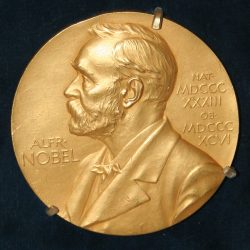
this week, you get the chance to hear a nobel laureate speak!
We’re back with Science Fair, Bwog’s weekly curated list of interesting STEM-related talks, symposiums, and events happening on campus. For science and non-science majors alike, our list will bring you events that will satisfy your scientific curiosity for everything from astronomy to zoology, and everything in between.
For anyone, related-majors and non-majors alike:
- Failing Upward: The Open Secret of Progress in Science with Nobel Laureate Martin Chalfie and Maiken Scott
- Event information: Friday, March 1, 2-3pm, Teachers College Milbank Chapel, click here for more info
- Event details: Teachers College, Columbia University, will host a lecture by Nobel Chemistry Laureate Martin Chalfie on the inevitable role of failure in learning and on the importance of basic, foundational research.
- How the Ice Sheets are Contributing to Sea Level: Sustainability Science Special Topics Seminar by Tim Creyts
- Event Information: Tuesday, February 26, 5-6pm, Hamilton Hall Room 702, Register at the link
- Event Details: Tim Creyts is a glaciologist and Lamont Associate Research Professor. He works on the theory of ice sheet flow as well as data from the ice sheets. His specialty is understanding processes occurring near the base of glaciers and ice sheets. His studies have taken him from the Yukon Territory and Alaska to Iceland and Greenland.
- Fast Radio Bursts: Alien Life or Distant Neutron Stars?, Hosted by Columbia Astronomy Public Outreach
- Event details: Friday, March 1, 7pm, Pupin Hall, click here for more information
- Event information: Public lecture, followed by guided rooftop stargazing, weather-permitting.
- Narrative in the Natural Sciences and Humanities Conference
- Event Information: Thursday, February 28, 8:30am-7pm and Friday, March 1, 8:30am-4:30pm in Faculty House, Free registration and conference schedule at the link
- Event details: As evidenced by the burgeoning fields of narrative medicine and science communication, narratives and narrating are also important tools for the natural sciences… The conference seeks to explore the following topics:
- What “narrative” means, and the role it plays, in the humanities, social sciences, journalism, law, the natural sciences, and medicine.
- Why humans create narratives–perspectives from anthropology to neuroscience.
- Narrating with “qualitative” and with “quantitative” data.
- Communicating to the public through narratives and storytelling.
- Computational Social Welfare: Application of Big Data in Research and Practice, by speaker Julian Chun-Chung Chow (UC Berkeley)
- Event information: Friday, March 1, 12:15-1:45pm, School of Social Work Room C03, click here for more information
- Event details: In this talk, Professor Chow will extend the application of big data analysis to the field of social work and welfare such as access to services, organizational efficiency, quality of public and private programs and cost reduction. He will then provide an overview of findings drawn from an innovative model of bid data science, applying data management and analytics to inform and improve the ways in which society can support vulnerable populations.
Intended for more advanced students of the given subject (but still open to all interested students):
- Steel Reinforced Grout Systems as an Effective Tool for Repair and Strengthening Existing Structures, Talk by Gianmarco de Felice (Roma Tre University)
- Event information: Thursday, February 28, 2:30-3:30pm, Schapiro CEPSR Room 414, click here for more information
- Event details: Steel Reinforced Grout (SRG) systems consist of ultra-high tensile strength steel cords embedded in inorganic matrices and externally bonded to the substrate… This talk will present the experimental investigation carried out for both the mechanical characterization of tensile and bond properties, and the assessment of full-scale structural members reinforced with SRG, thus providing an overview of this exciting and very promising emerging technology.
- How will technology impact tomorrow’s athlete?
- Event Information: Thursday, February 28, 5:30-7:30pm, Dodge Fitness Center (Lou Gehrig Lounge, 3rd Floor), click here for more information
- Event details: February’s “Third Thursday ‘event will feature an exciting announcement about new funding for interdisciplinary startup projects and the Makerspace at SEAS! Brent Walker Ph.D., Columbia Associate Athletics Director for Championship Performance will be joined by Houtan Fanisalek, a seasoned CTO and SEAS grad. Both speakers will share knowledge in athletics, human performance, and the new technologies that can support better performance, recovery, tracking, and training.
- Engineering human pluripotent stem cell morphogenesis to control organoid, by speaker Todd McDevitt (UCSF)
- Event information: Friday, March 1, 11am-12pm, Mudd Hall Room 833, click here for more information
- Event details: “Human pluripotent stem cells (PSCs) provide a unique substrate to study fundamental principles of developmental biology including the morphogenesis of multicellular aggregates into functional tissues commonly referred to as “organoids”. We are particularly interested in understanding how form and function arise in complex multicellular systems in order to engineer tissues from human PSCs.”
nobel medal via wikipedia


 0 Comments
0 Comments